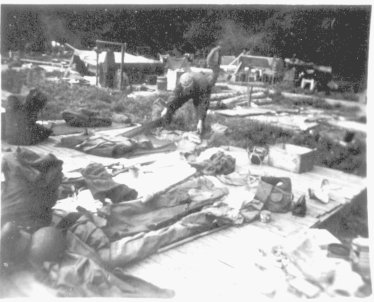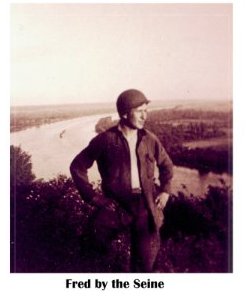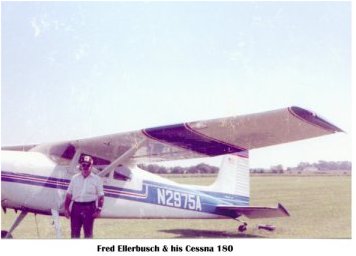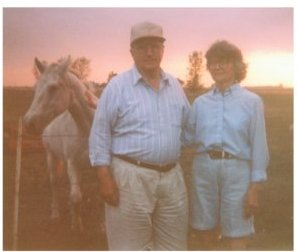|
|
|
|
1944 |
Fred & Ruby 1995 |
|
|
|
|
1944 |
Fred & Ruby 1995 |
When we graduated ASTP Basic Phase in Iowa City and left Iowa City, I went to Truax Field, Madison, Wisconsin,
to Air Corps Radio School, and graduated. Then we went to Air Corps Electronics School in Chanute Field, Champaigne,
Illinois, and I graduated. I went to Boca Raton, Florida, to radar school, and graduated from radar school.
In those days, radar was very new and our work down there was very secretive. We never stood any formations. Our
buildings were all laid out haphazard, not in any formation either. We would get to one building and just fall
out and walk through the sand to the next building that we needed to go to. We went from our barracks to the mess
hall to the barracks to the school without standing any formation.
We'd get up in the morning and just wander off to the mess hall without making any trails-and you'd eat and go
back down to the school without making any trails-just wander through the sand. We never took any notes. You had
to keep it all in your head.
We did hear that there were some submarines that were laying out. Boca Raton means "mouth of the rat."
It was a mouth of the river-it was an inlet there-where the tide would come in and go out. When the tide went out,
the water would be brackish for quite a ways, and we heard that there were some subs from time to time that would
come up and lay in that brackish water and figure out whatever they could from there. I don't know if it was true
or not.
From Florida we went to Greensboro, North Carolina, to prepare to ship out. From there we went to Camp Kilmer,
New Jersey, to the Port of Embarkation. When we were prepared for overseas, we shipped out on the Queen Elizabeth
and went to Greenock, Port of Glasgow, Scotland. From there we went to southern England by tram, to the Air Corps
C-47 outfit. We were T.O. fillers and not replacements. Radar was pretty new then. We were at Barkston Heath Airport.
While in England, we did have time to try out the pubs in Robin Hood's old stomping grounds-Nottingham, Lincoln,
Sleaford, and Barkston Heath. I never did see Maid Marian but did see others.
We went piecemeal from England to France, and I went across several times. The morning of the Ruhr, the Battle
of the Ruhr, we got our radar frequencies all set in France, jumped on a C-47, and went to England and pulled KP
for paratroopers that we would haul to the Battle of the Ruhr that day. They had just about all the C-47s the field
would hold, and they took off by threes, and the threes took off about as close as they could.
My best buddy, Dick Doucette, was French from Bristol, Connecticut, and was near enough fluent in French that we
were in good shape in France. When we left England for France for good, he was one of the first ones to go, in
order that he could translate. He immediately sent word back -- "Fred, bring a saw." When I stepped off
the plane in France, he met me and said "Come on!" He had found a house that had a second floor just
the right size for our tent. We sawed out that second floor, and we had the only tent with a floor, and it rained
every day.

Now I'll tell exactly when Steve Wright got to France. He said when he got there, "Hitler shot himself, and I have the newspaper record of it."

When we had been in England just long enough to get organized to go to France, we had C-47s and pull gliders,
and we hauled everything including paratroops. Abbeville, France is right on the channel, and we landed on the
airfield that had been
Hermann Goering's fighter base for his Abbeville kids. He had the elite German fighters, and their planes had yellow
noses. His airmen had lived in little prefab houses with their roofs at ground level.
We went out one day and got five of these, and made a beer hall with an 85-foot bar-all hauled from Germany and
C-47s. The bar was complete with glassware, chairs, and Hitler's picture-which only lasted one day. Now we had
a beer hall, but the French beer was terrible-until someone figured out what to do about that. Our CO, our commanding
officer, printed enough tickets for a truckload of beer-and then when they were sold, he sent a truck to Belgium
and got a truckload of really good beer.
In England you drank cold beer-in the wintertime. You drank warm beer in the summertime. You drank three beers
and three kickers and then they'd kick you out.
In France we were in tents and our tent ropes would shrink in the sun and stretch at night. So we would tie two
tents together and stake the outside ropes, tie the inside ropes together, and throw a log on the ropes. Now you
had nice tension. The log rode up and down.
Well, when you left a nice beer hall and got mixed up in the ropes, it was okay. But when you were in your tent
trying to sleep-and the tent was going around-you didn't really know whether somebody else was mixed up in the
tent ropes or whether you had one too many beers.

We stayed there in France till VE Day, till the war was over in Europe. Then we went to Trinidad in the American
Theater until VJ Day in the Pacific.
When we were supposed to go from France to Trinidad, they sent an inspection team up from the American Theater
to inspect our airplanes. I don't just know for sure how many planes they expected to get there, but it wasn't
very many. Some of these planes really were pretty bad. In the European Theater before the war was over, if you
had an airplane that would fly, you better get it up there and fly it. I've stood on the airway and threw gas in
the air scoop when they started them. And I've helped put a bungee cord around the prop and hooked a jeep on it
and pulled it to start it. They were really pretty bad.
Well, we changed out all the engines, put new engines in all the airplanes, and we took -- I don't know where they
got them but they got a whole bunch of bolero wingtip tanks, those wingtip tanks that are out on the wing tips-and
we put them in the airplanes right in the cargo compartment two and two on skids, just on a pallet, and then hooked
them up to the fuel line with copper tubing. It was necessary because it was really too far for C-47s to fly from
France to Trinidad.
They only flew from France to Trinidad with just an ordinary crew and didn't haul any passengers. The rest of us
went down there by ship. I don't remember anymore what the ship was.
Anyway, every airplane got there. When we got to Trinidad, what a sight. There was a mile and a half of C-47s,
wingtip to wingtip. We saw, of course, our old planesour old friends we'd been through the war with.
I don't remember them all-but I remember fight by where I was all the time was Hard Rock and Red Dog. And then
there was the Gas-Laden Lady and Old Pooper and the Big Gas Bird. As long as we were in Trinidad, we'd see these
old friends.
When we left France, I had the best radar spec number in the Air Corps. When we got to Trinidad, we took a lot
of the radar stuff and put it in a big pile. We didn't need it anymore.
I went to work with the aircraft mechanics overhauling airplanes. Before long, I could do a fifty-hour inspection-and
then before long I could do a hundred-hour inspection.
What the big job was was hauling troops out of Africa. The big C-54s would haul from Dakar, Africa to Belem, in
South America, with one stop at Ascension Island about in the middle of the Atlantic. It was too far for our C-47s.
Then these C-47s would haul them from Natal, Brazil-to Belem-to Miami-and then come back empty to Trinidad. They'd
make one of these three-legged trips and then do a fifty-hour inspection.
When VJ Day was in the Pacific -- I don't remember the day anymore but I know they helped celebrate that in the
American Theater as well-we had quite a celebration down there. I think of all the guys on the field....
We were split up, and three of us went -- one for beer, and one went to the officers' club for something better,
and the other one went to the flight line to get the Very pistols (flare pistols) -- and it wasn't very long until
everybody that was on duty was driving around that big flight line in jeeps, trying to keep us from burning up
that flight line full of airplanes that was all soaked up around there with hundred-octane gas. Well, of course
they did.
When they got done with the job of hauling troops out of Africa, it didn't take very long until we were rotating
guys home. Of course, we went by the point system, but it went pretty quick when it went-and one day I jumped a
C-47 and went to Miami.
Now it was almost time for the fat lady to sing. I got a month leave in December of '45 -- went back and got discharged,
and it was over.
When I got discharged, I came home to Iowa and started farming. On February 1, 1948, 1 married Ruby Stief, and
in eight years we had five children-two boys and three girls. Just when our expenses were the heaviest, we lost
two crops in a row -- 1955 and 1956.
1 started to study at night, and when Western Electric opened a new plant in 1958 in Omaha, we sold out farming
and moved to Omaha. I worked in electrical and electronics.
As soon as we could, we bought a farm, at Decatur, Nebraska. I now worked a job and a mooch-as we called it-seventy
miles apart. We had 320 acres of corn, soybeans, and about 35 cows raising calves. My back and feet were wearing
out, mostly from all the road work-and I got homesick for an airplane. I bought first a Cessna 150 and later a
180 tail dragger-and that was the answer. I could get off work, come home and eat supper like a civilized person,
get the plane out, and go to the farm. We'd check the cattle, the fences, and the water before we had to land-then
get on the tractor and farm until about I I o'clock at night-and get in the plane and go home. We had an airstrip
on the farm and could take off in the dark. There were lights at the airfield at home.

If you want to know how to get tired of either farming or the electronics business, that's how to do it. Of course, there were all kinds of things that we wouldn't take the world for. We really liked our cows and calves, and we had both draft horses and riding horses, and lots of pheasants, quail, deer, coyotes, and homed owls. They're the ones that teach you what wild is.

When I could retire, we wanted to do something for the Lord while we were still able. We sold our home in Blair, Nebraska, and went to Mexico. We went back and forth about six times-the last two times in 1988, up in Chihuahua. By now I could speak pretty good Spanish and give messages in Spanish. (My wife doesn't like the term "preach.")
The day came when my wife had had cancer and I had some heart trouble. We were telling the Lord that we didn't
know when we would ever get back to Mexico, and he seemed to say, "Fred, you just stay in Nebraska and I'll
send the Mexicans up there." He has been very faithful. There are a lot of them up here.
Well, now it's 1999, and we just tell everyone, gringo or español, that if they don't know for sure and
for certain where their last residence is going to be-where they'll end up-be sure to make it top priority to find
out.
We're both in good health, except for the normal stuff. But I'm sometimes reminded of what the monkey said when
he crawled out of the lawnmower -- "It won't be long now." There are surely a lot of us old boys missing
already, aren't there? It's the ones who are blessed who will be at our reunion, if we have it. Hope to see you
there.